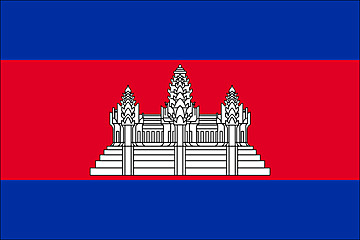Chay Lo, One of the Top Ten
News from Cambodia
CHAY LO, one of the ten « Top Outstanding Young Persons » of the world !
CHAY LO, “1001 fontaines pour demain” co-founder, recognized as one of the ten « Top Outstanding Young Persons » of the world !
On November 6th, 2007, during the Junior Chamber International World Congress, in Antalya (Turkey), Chay Lo will be recognized, along with nine others, as one of the most remarkable young person worldwide.
The Outstanding Young Persons of the World (TOYP) Program serves to formally recognize young people who excel in their chosen fields and exemplify the best attributes of the world’s young people. By recognizing these young people, JCI encourages them and others to seek excellence and serve others. Thus, JCI contributes to prepare better leaders, who will create better societies.
Chay Lo will join well-known personalities, honoured in the past years, such as Her Majesty the Queen Rania of Jordania (2004), the former French Finance Minister Thierry Breton (1988), the pakistanese lawyer Ansar Burney (1991), who leads civil rights defense in his country, or the swedish David Lega (2005), three times swimming world champion and member of the Paralympic International Committee.
Chay Lo’s story
Chay Lo comes from a small village in the north west of Cambodia. His father works a two-hectare rice field and his mother raises silkworms. As a child, Lo goes to the primary school in his village but the ongoing civil war which lasts in this region prevents him to keep a regular pace in his studies. However, he goes on to further his education in the regional capital of Sisophon. Having passed his baccalaureate with flying colours in June 1996, he is taken in by a French scholarship association, Enfants du Mékong, who helps him to start his higher education in Phnom Penh.
A few months later, Lo is diagnosed with a serious lung tumour which can not be treated in Cambodia. Thanks to the people in charge in Enfants du Mékong and their doctor friends, he is able to go to France for an operation. He stays there for three months and shows a remarkable ability to adapt to the western culture. By the time he returns to Phnom Penh, Lo speaks French fluently and within two months he has caught up with the other students in his class in all the other subjects.
In September 1997 he passes the entry competition to the most prestigious high school in Cambodia (the Cambodian Institute of Technology) and becomes an “icon” in the sponsorship area by becoming the first child to come out of the sponsorship system to have attained such a result. In June 2003 the ITC awards him a degree in Agricultural Engineering. His results are so good that he is offered a study grant with one of the most prestigious French higher education establishments, l’Ecole Nationale du Génie Rural des Eaux et des Forêts (ENGREF), from which he qualifies in September 2005, making Lo one of highest educated person of the whole Cambodia.As part of his studies, Lo trained on many projects dealing with small-scale drinking water networks in rural areas, and hoped to work in Cambodia, after his studies, in the area of irrigation and water treatment. During his time at the ENGREF, he sets up an international aid NGO with two other people (“1001 fontaines pour demain”) which seeks to ‘enable small isolated communities to fulfil their drinking water needs independently and without any specific infrastructure or skills’. The operations of this NGO are based on a water treatment unit which uses an ultraviolet rays system powered by solar energy and implementation schemes (based on micro-financing models) which ensure the sustainability of the installations by making a village family create a small water production business for the benefit of its community.
Lo manages, from France, an initial pilot project in 2005, after which he goes back to his country to dedicate himself fully to the development of « 1001 fontaines » in Cambodia. In July 2006 he starts a second project covering eight new villages, with approximately 10,000 beneficiaries, and is currently working on a deployment strategy for these solutions throughout Cambodia with the aim of supplying at least 200 villages (with a beneficiary population of approximately 200,000) over the next five years. The NGO which he founded works in parallel to bring the solution developed in Cambodia to other countries.
Posted by Khemara Jati
khemarajati@googlegroups.com
Pour afficher d'autres options, visitez ce groupe à l'adresse http://groups.google.com/group/khemarajati?hl=fr


0 Comments:
Publier un commentaire
<< Home